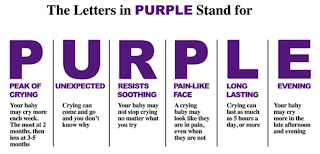From the Web Site:
Period of PURPLE Crying® is the phrase used to describe the point in a baby’s life when they cry more than any other time. This period of increased crying is often described as colic, but there have been many misunderstandings about what “colic” really is
Many of you came to this website because you heard about the Period of PURPLE Crying, so this is a good place to connect this phrase to what we have been describing about the crying of normal infants in the first weeks and months of life. The Period of PURPLE Crying is the phrase that we at the National Center on Shaken Baby Syndrome have adopted to help capture for parents what the typical features of crying are in normal infants. As described elsewhere in the website, the letters of the word PURPLE each refer to one of these features:
The Period of PURPLE Crying begins at about 2 weeks of age and continues until about 3-4 months. There are other common characteristics of this phases, or period, which are better described by the acronym PURPLE. All babies go through this Period it is just that during this time some can cry a lot, some far less, but they all do go through it.
There are other characteristics of this stage. For example, studies have shown that the crying tends to be much heavier in the late afternoon and evening. Just when parents are getting home from work and the most tired. Parents try many ways to keep the baby from crying, or stop the crying, and some of them work, well, they seem to work for awhile. “I take my baby in the car and drive around the block in my PJ’s,” said one mom. “That worked for three nights but on the fourth, he would not stop crying. I tried several others things like warm baths, singing and swaying and nothing worked. Then all of a sudden he would just stop, for no apparent reason. His crying is so unpredictable”, she said.
When these babies are going through this period they seem to resist soothing. Nothing helps. Even though it helps when they are fussy or crying other times, it is different when they go through these inconsolable crying bouts. Nothing seems to sooth them.
This increased crying, which is normal, can be particularly stressful for new fathers. In addition to each of your many other responsibilities, you are now responsible for caring for and providing for your infant and when you get the impression that your baby doesn’t want you or isn’t happy to see you, this can add to the stress and frustration you may already be feeling from other things in your life.
“It (infant crying) is a normal developmental stage that research has shown, amongst other things, is most likely to occur in the late afternoon and evenings"
Please be aware that there are lots of suggestions out there for taking various kinds of medications for this normal increased crying. While some of them may not be harmful, some of them are. There are no medications that are always safe for all babies.
The literature that offers advice to parents who are frustrated by their infant’s crying can be very misleading, even though it is meant to help care givers. Very few make it clear that all soothing methods help some of the time, but no soothing methods help all babies all of the time. Whatever you do, try not to become more frustrated by your infant’s crying. The one thing that the parent advice literature most often fails to mention is that the only negative consequence of early increased crying for the infant is if the care giver loses their control and shakes or abuses the baby. That is the most important thing for everyone, and everyone who cares for you baby, to know.
Similarly, please be very skeptical of interventions that promise you a way to soothe your baby. Expecting that you can soothe a baby and then failing to do so can make you more frustrated.
While a crying baby may be one of the most frustrating things you are dealing with, it is probably not the only thing. Many new fathers have expressed concerns about things like their baby’s sleeping habits, sharing responsibilities with their spouse and changes in their routine. All of these are valid concerns and can also be very frustrating.
Often fathers would feel much better if they could just “fix” a problem. They are used to figuring things out and reading a manual and then they seem to be able to successfully fix the situation. Well, that just doesn’t work with babies. They are what they are, they do what they do, and there is just not much a dad can do to change that. It is important to first recognize that it is not your job to “fix” this baby. Understanding your baby’s normal developmental stages is the first real step in making progress and controlling your frustration
What you need to know thought is that this increased crying your baby is going through isn’t triggered by you. It is a normal developmental stage that research has shown, amongst other things, is most likely to occur in the late afternoon and evenings, likely around the same time you might be returning home from work. So, while you may attribute your baby’s crying to you or something you are doing you can rest assured that it has nothing to do with you at all.

.jpg)
Thanks for sharing this information with your readers.
ReplyDeleteVery nice article, exactly what I needed.
ReplyDeleteFeel free to surf to my site :: http://ekredyt.org
Please let me know if you're looking for a writer for your site.
ReplyDeleteYou have some really good articles and I believe I would be a
good asset. If you ever want to take some of the load off, I'd
absolutely love to write some material for your blog in exchange for a link back to mine.
Please shoot me an e-mail if interested. Many thanks!
Feel free to visit my page: legal Aid family
law - google.ca,